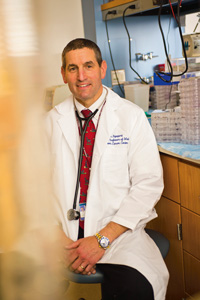 In April the University of Maryland Medical
Center unveiled the Fannie Angelos Cellular
Therapeutics Laboratory, a state-of-the-art
facility that will allow scientists to create the
next generation of cell therapies for advanced
and resistant forms of leukemia and lymphoma.
In April the University of Maryland Medical
Center unveiled the Fannie Angelos Cellular
Therapeutics Laboratory, a state-of-the-art
facility that will allow scientists to create the
next generation of cell therapies for advanced
and resistant forms of leukemia and lymphoma.
Baltimore attorney and Orioles owner Peter G. Angelos made a lead gift to the lab, which was named in memory of his sister who passed away in 2015 of complications from a bone marrow disorder. The laboratory is also made possible thanks to the partnership of Neil and Emily Kishter and the family of Hamish and Christine Osborne.
“We are extremely grateful to our partners in philanthropy who made significant contributions to this remarkable new lab,” says Kevin Cullen, MD, the Marlene and Stewart Greenebaum Distinguished Professor in Oncology and director of the University of Maryland Marlene and Stewart Greenebaum Comprehensive Cancer Center (UMGCCC). “Philanthropic support is crucial for our success. It allows us to invest in innovative research, advanced equipment and technology, and state-of-the-art facilities, all of which improve health outcomes locally and worldwide.”
Kim Hankey, PhD, is the new director of the Fannie Angelos Cellular Therapeutics Laboratory and will help to implement new research and cellular therapy projects, and Clarissa Saba is the new quality manager of the lab.
In the Fannie Angelos Cellular Therapeutics Laboratory, scientists produce cell-based therapies and cancer vaccines for immunotherapy research. Prior to the lab’s opening, researchers relied on outside facilities and other academic institutions for genetically modified cells to treat patients in clinical trials.
“Having our own cell-processing laboratory increases our ability to offer novel and promising cell-based therapies to our patients,” says Aaron P. Rapoport, MD, professor of medicine and the Gary Jobson Professor in Medical Oncology at the University of Maryland School of Medicine, and director of the Blood and Marrow Transplant Program and co-leader of the Tumor Immunology & Immunotherapy Research Program at UMGCCC. “It also helps our investigators move their basic and preclinical research into the clinic more quickly so that patients may benefit from our discoveries.”
In recent years, immunotherapy has emerged as a promising treatment for certain types of cancer. A patient’s own immune cells, or T cells, can be genetically engineered to recognize and attack a cancer. Last year, the U.S. Food and Drug Administration (FDA) approved two versions of immunotherapy, which are known as chimeric antigen receptor (CAR) T cell therapies — one for children and young adults with leukemia and another for adults with non-Hodgkin lymphoma. The latter is now offered at UMGCCC. In addition, researchers are testing cancer vaccines and antibody-based therapies to stimulate the immune system to kill other kinds of cancer cells.
Since 1998, Dr. Rapoport has led six major clinical trials with more than 150 patients. In his most recent study, patients with multiple myeloma — a cancer of the bone marrow — underwent a stem cell transplant to harvest their T cells. While T cells typically use a protein to fight off an infection, they often do not recognize cancer cells. As a result, the disease spreads.
In the clinical trial, Dr. Rapoport and his team reengineered the harvested T cells and infused them back into the patient. The results showed significant success using genetically modified T cells to treat patients with multiple myeloma.
To make a gift in support of the Fannie Angelos Cellular Therapeutics Laboratory, please click here and select "Cell Therapy Program" in the drop down menu.